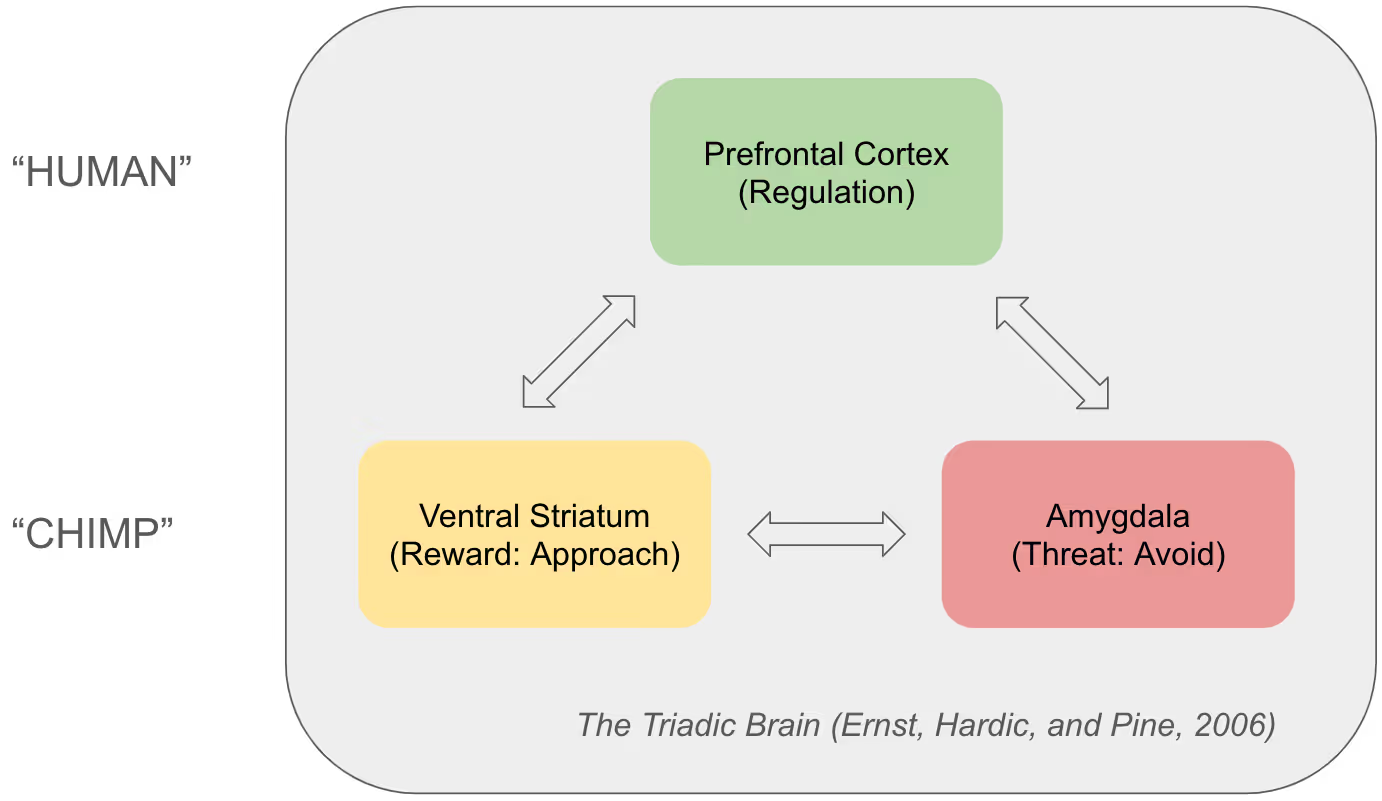A Guide to Harnessing Psychological Safety

Ever wondered if creating a safe space for your team could lead to unprecedented growth and profitability?
I’ve included a few tips at the end of this short article, but first let's dive into the neuroscience and psychology behind it, reflecting on insights from my recent workshop at Henley Business School's MSc in Coaching for Behavioural Change. ⬇️
What is psychological safety?
Psychological safety is the absence of interpersonal fear. Feeling psychologically safe allows people to perform their best.
In an organisational context, a simple explanation would be that if we’re psychologically safe, we’re safe to take risks in our organisation. The opposite is that the less safe we feel, the less likely we’re prepared to take calculated risks for the benefit of the organisation.
What’s going on in our brains?
You may have encountered Steve Peters’ mind management programme in his book, The Chimp Paradox, using the metaphor of a chimp to illustrate the impulsive part of our brain. Complementing this, the more rational “human” part of our brain represents logical thinking and the ability to make considered decisions.
From a neurological perspective, let's explore The Triadic Brain, based on the work by Ernst, Hardin & Pine in 2006.
The Triadic Brain consists of three parts responsible for reward and threat stimuli, driving our behaviours.
- The Ventral Striatum is the reward impulse or the "chimp," leading us to approach a situation.
- The Amygdala is the threat impulse or another aspect of the "chimp," prompting us to avoid a situation.
- The third part is the Prefrontal Cortex, the "human," responsible for regulating any given situation.

While emotions from the Ventral Striatum and Amygdala serve as protective mechanisms, it's preferable that they are regulated by the Prefrontal Cortex. The challenge lies in the quicker reactions of the emotional chimp compared to the slower, more measured and rational human responses.
In a workplace where the prevailing atmosphere is one of apprehension, where individuals fear reprisal or humiliation for expressing their ideas, asking questions, voicing concerns, or admitting mistakes, the metaphorical "chimp" within us becomes hyperactive. This heightened state obstructs the optimal functioning of the more rational human brain.
These reactions are often learned behaviours ingrained in individuals, drawing from past experiences on a subconscious level. The pervasive impact of such an environment is detrimental to the well-being of most people. However, for those predisposed to an already heightened threat response, the consequences can be particularly debilitating.
Under these conditions, the rational part of the human mind struggles to manage these emotions, leading to hesitancy in expressing oneself, heightened levels of fear and anxiety, and an overall decline in both engagement and performance.
Now that we understand a bit about the neuroscience and its impact on our responses, let's delve into what it takes to foster psychological safety in our teams.
What does it take to feel psychologically safe?
The most fundamental element of being psychologically safety is trust, but what is trust? Quite simply, it can be boiled down to “predictability based on previous experiences”.
I remember a situation in a new role at an executive search company, where my manager, Will, gave me the freedom to try something new even though it felt like a huge risk to me at the time. I’d opened up an opportunity to speak with a C-level team at a global tech company about hiring a new Director of Engineering. It was a retained search and would be a big deal if we won this piece of work. We arrived at the meeting together and I was fully expecting him as the more senior person to take the lead. However, much to my bemusement, right before we went in he said, “you’re leading, I’ve got your back but I believe you can do this yourself”. Slightly apprehensive at first, I grew into the meeting and was ultimately successful in winning the business. I always look back at that as a great example of feeling psychologically safe. I was nervous, but I felt empowered and trusted, and implicitly understood that if I made a mistake it would be ok, as Will had my back. After that, and for the rest of my tenure I was able to excel because Will had created that environment. I knew and trusted that this was a place where I could step out of my comfort zone and not have a fear of failure.
Contrast that with a manager that would not think twice about publicly speaking over or perhaps even publicly denigrating their more junior team member in front of other senior colleagues, or, worse still a client. The resulting behaviour would be that the team member justifiably expects that if they speak, they might be shot down in flames and humiliated. In this type of situation, the chimp kicks in immediately with a strong ‘avoid’ signal. It may be an important insight they have to share, but even when the human side of the brain kicks in with a more reasoned analysis, the individual’s previous experience tells them it’s not worth the risk.
A great deal of our emotional responses and behaviours are derived from our experiences and environment and this is where you as a leader or colleague can have a tremendous impact on making your team or colleagues feel psychologically safe. John Gottman, a researcher who has been studying relationships for over 30 years, says that trust is built in the smallest moments.
There will be opportunities in your professional relationships that if capitalised on, will reap a harvest of trust and psychological safety that will enable your team/colleagues to thrive. It’s up to you to take them!
What You Can Do to Help Your Team?
Drawing from Harvard Business School’s Dr. Amy Edmondson’s model of Psychological Safety, here are three key strategies:
1. Setting the Scene
- Clear Expectations: As a leader, explicitly outline your expectations. At the executive search company, my manager set clear and simple expectations for our meeting, providing a sense of security. Don't assume everyone feels secure unless you've established boundaries.
- Purpose-Driven Leadership: Instil a sense of security by aligning the team around a meaningful purpose. For instance, imagine that you’re running an engineering team for a train operator. What would inspire your team more, a message that tells them they're fixing and maintaining trains to ensure targets are met and profitability is maximised, or that they’re fixing trains to ensure our customers get home on time to their families?
2. Inviting Participation
- Demonstrate Humility: Foster open communication by being transparent about your knowledge and limitations. Saying, “Here's what I know, here’s what I don’t know” encourages your team to be equally open.
- Appreciative Enquiry: Cultivate an environment where questioning and challenging the norm is welcomed. Encourage dialogue to uncover strengths, weaknesses, advantages, and opportunities.
- Establish Discussion Structures: Allocate dedicated time and space for discussions. Create an environment where respectful, yet passionate, conversations are encouraged.
3. Responding Productively
- Express Appreciation: Regularly acknowledge and appreciate your team’s efforts. Don’t wait until someone leaves the company to share how awesome you think they are!
- Destigmatise Failure: Build a culture that values learning from mistakes. Embrace the idea that everyone makes errors and emphasise the lessons learned.
- Address Breaches: Establish an effective feedback mechanism for team members to express when they feel psychologically unsafe. Act promptly and constructively to address such concerns.
By implementing these strategies, you can contribute to a workplace culture that fosters psychological safety, allowing your team or organisation to thrive.
In conclusion
Returning to the metaphor of the chimp and human brains, when psychological safety prevails, the impulsive "chimp" is less likely to be activated, allowing the more creative human brain to take charge. This shift directs energy towards ideation, innovation, and fosters higher levels of engagement, improved communication, and collaboration.
Moreover, a workplace culture rooted in psychological safety contributes to reduced stress levels and increased well-being for team members. Ultimately, these factors converge to enhance employee performance, leading to increased business growth and profitability.
Ready to cultivate psychological safety in your team? Share your thoughts on how you foster a culture of trust and innovation. 💬🌐
If you’d like to discuss in more detail, require HR consultancy services or are interested in executive coaching, please reach out to me at steve@encouragerhr.co.uk
What People Say About Encourager HR
Hear directly from companies across various industries about their experience partnering with Encourager HR.
REBECCA ROSE
Director, MCA Consulting Engineers Ltd
Google Review
DAVID BADOVINAC
Director, TimeWise Labs
ALVARO SILVA-SANTISTEBAN
AI Solution Lead, Google
Jamie Peacock
Ex-England Rugby League Captain & Leadership Coach



